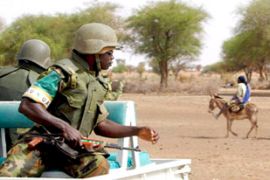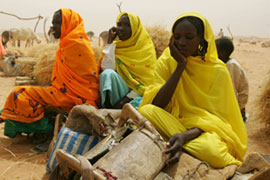Sudan allows UN troops in Darfur
More than 3,000 soldiers and police, as well as equipment, to boost African Union force.

Published On 11 Apr 2007
The UN and Sudan agreed in November on a three-stage plan to strengthen the AU force, culminating with the deployment of a joint AU-UN force with 17,000 troops and 3,000 police officers.
But Omar al-Bashir, Sudan’s president, has since backed off from the deal, saying he would only allow a larger AU force, with technical and logistical support from the UN.
Pressure
Mark Seddon, Al Jazeera’s correspondent at the United Nations, said Tuesday’s agreement could have been the result of pressure on the Sudanese government.
 |
| More than 200,000 people have been killed and 2.2 million displaced in Darfur [AFP] |
China, an important trade and strategic partner, is believed to have put pressure on al-Bashir to accept the UN troops.
And Britain, which assumed the presidency of the UN Security Council this month, had been pushing for tougher sanctions against Sudan – a push Ban Ki-moon, the secretary-general, had urged Britain and the US to delay to allow for negotiations with Khartoum.
The first phase of the UN’s deployment, a light support package including UN police advisers, civilian staff and additional resources and technical support, has already been sent to Darfur.
No helicopters
| Your Views |
The meeting in Addis Ababa on Monday focused on clarifying the second stage of the UN plan. However, Sudan would not allow the UN to deploy “attack helicopters”.
Seddon said the issue could become another sticking point.
Okabe said the UN was hoping for “a positive and expeditious response” from the Sudanese government on the outstanding issue of the deployment of “attack helicopters” before discussions on Darfur at the UN on Monday led by Ban.
In March, Ban and al-Bashir reached an agreement on the sidelines of the Arab League summit in Riyadh, Saudi Arabia, to work out differences on the heavy support package at Monday’s meeting in Addis Ababa.
The question of a hybrid UN-AU force, however, remains problematic.
Ban said last week: “We hope that through these consultative meetings, we will be able to deploy hybrid forces as soon as possible.”
The undermanned and under equipped AU force has been unable to stop violence in Darfur, where more than 200,000 people have been killed and 2.2 million forced to flee their homes in nearly four years of fighting between the government and ethnic African rebels.
Source: Al Jazeera, News Agencies